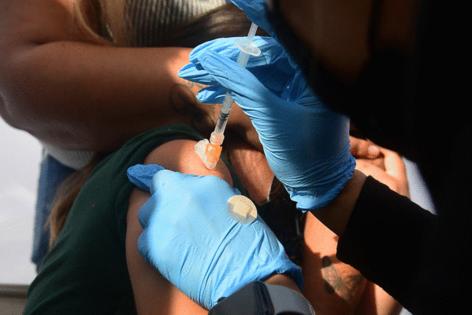How many Kentuckians are opting out of childhood vaccines? What the data show
Published in News & Features
Fewer Kentucky kindergarten students have received the vaccines required to attend school, and data from the state’s School Immunizations Survey shows religious objections are a growing reason why.
State data for the 2024-25 school year puts the overall percentage of kindergarten students fully caught up on required vaccines at 82%. That’s behind the national rate of 92.1% for the diphtheria, tetanus and pertussis (DTaP) vaccine and 92.5% for the measles, mumps, rubella (MMR) and polio vaccines, according to U.S. Centers for Disease Control and Prevention data.
The trend comes as the federal government is withdrawing investment in mRNA vaccine technology, which helped pulled the nation out of the coronavirus pandemic and led to the first COVID-19 vaccines. The Department of Health and Human Services announced this week that Health Secretary Robert F. Kennedy Jr. has canceled nearly $500 million in grants and contracts for developing mRNA vaccines.
Earlier in May, HHS canceled a nearly $600 million contract for development of a bird flu vaccine, according to The New York Times.
Kentucky Public Health data shows a growing share of vaccine objections are because of religious reasons. The state allows for vaccine exemptions on religious grounds if parents or guardians provide a written and sworn statement.
Out of the 51,319 Kentucky kindergarten students surveyed in 2024-25, as many as 15.9% were not up to date with all vaccines. Up to 2% of students surveyed objected on religious grounds, and that rate has been steadily rising since 2020-21, when it was 0.83% of 50,595 kindergarten students surveyed, state data show.
Kentucky’s data mirror a national trend, with the rate of non-medical exemptions growing from 1.9% in 2020-21 to 3.4% in 2024-25, CDC data show.
Kentucky kindergarten students are also behind on vaccines for measles, whooping cough (pertussis), polio and other diseases, state data show.
As of Thursday, there have been 385 confirmed whooping cough (pertussis) cases in Kentucky in 2025, according to Kendra Steele, spokesperson for the Kentucky Cabinet for Health and Family Services.
“Kentuckians are urged to remain up-to-date on pertussis immunizations. The pertussis immunization is combined with the tetanus and diphtheria vaccines (DTaP and Tdap) and is required for Kentucky school children. Data from the 2045-2025 Kentucky school immunization survey indicates that only 86% of kindergarteners and 85% of seventh graders are up-to-date on their required pertussis immunizations,” Steele wrote in an email to The Lexington Herald-Leader.
Kentucky isn’t alone. The CDC notes that during the 2024-25 school year, vaccination coverage among U.S. kindergarten students decreased for all reported vaccines from the year before. Coverage with MMR, DTaP, polio and varicella (chickenpox) vaccines declined in more than half the states compared to the previous year.
To understand why, we spoke with Dr. Steve Davis with the Lexington-Fayette County Health Department.
Question: Why are more Kentucky students behind on required vaccinations?
Answer: Davis, who is 75, is old enough to have seen first-hand the severe complications unvaccinated children can suffer, either by their parents’ decision or simply because an effective vaccine wasn’t available at the time. That includes children with brain and blood infections, meningitis, pneumonia, heart disease, liver disease and polio, Davis said.
“One of the things I would want parents to know is the immunizations that we’re asking children to take, it’s not to prevent just mild illness, it prevents serious illness or even, unfortunately, death,” Davis said. “I have seen this occur. I mean, I’ve been at the bedside when this has occurred, and it’s tragic because these are vaccine preventable diseases.”
Davis points to several factors to explain the downward trend in Kentucky’s school immunization rates in recent years. The COVID-19 pandemic and the disruptions to health care are significant, but Davis also points to a general need for more public health education.
“I’m not pointing at families. I’m looking in the mirror,” Davis said. “I think all of us in the health care profession need to really get more robust educational campaigns out about the importance of vaccination.”
Q: How to catch up if your child is behind on vaccinations
Answer: If cost is a barrier, check with your local health department and ask about its Vaccines for Children program. The program provides vaccines at no cost to eligible children, including those who are uninsured, underinsured or are Medicaid eligible.
A full list of VFC providers is available online through the Kentucky Cabinet for Health and Family Services.
©2025 Lexington Herald-Leader. Visit kentucky.com. Distributed by Tribune Content Agency, LLC.







Comments